Nobel Laureates to Arctic Council: No More Drilling
As the Arctic Council’s senior officials prepare for a meeting in Fairbanks, Alaska, a group of Nobel Peace Laureates sent a letter on Monday to heads of state, as members of the Council, urging them to protect vulnerable areas and the climate by removing Arctic waters from any future oil and gas exploration.
The letter, signed by the five members of the Nobel Women’s Initiative, highlights the urgency of taking meaningful action on climate change and leaving fossil fuels in the ground. It also calls attention to the serious risks that drilling in such a remote and sensitive region poses to Indigenous communities, wildlife, and the environment.
“Climate change is threatening hundreds of millions of lives and livelihoods across every continent, making it not only the environmental challenge of our time, but also a critical issue of human rights, justice, and equity. As recipients of the Nobel Peace Prize, we believe that it is one of the greatest threats to global peace and stability,” the letter states, also noting that the impacts of global warming are especially acute in Arctic regions.
The letter also comes in advance of the imminent release of the Obama Administration’s five year offshore drilling plan, which represents a critical piece of President Obama’s legacy on climate and the environment. As the current chair of the Arctic Council, the U.S. can make a strong show of leadership for other Arctic nations to follow by removing the U.S. Arctic Ocean, not just from its current plan, but from all future oil and gas exploration and production, states the group.
Noting that many members of the Arctic Council recently pledged to work to limit global warming to 1.5 degrees or less, the letter serves as a reminder that Arctic oil “is oil that we simply cannot afford to burn if we are serious about meeting our climate goals.”
“The Arctic Council has the opportunity to serve as a model of the international cooperation that will be needed as we collectively phase out fossil fuels and transition the world to cleaner, more sustainable sources of energy,” the Nobel Laureates write. “We urge you to seize this moment, to set a high standard for multilateral climate leadership, to protect the Arctic Ocean from the dangers of fossil fuel extraction, and to lead as the world builds the safe, clean, and renewable energy future we need.”
The Letter
Dear Heads of State in the Arctic Council,
2015 was the hottest year in recorded history. It surpassed five other milestones in the last decade alone. Climate change is threatening hundreds of millions of lives and livelihoods across every continent, making it not only the environmental challenge of our time, but also a critical issue of human rights, justice, and equity. As recipients of the Nobel Peace Prize, we believe that it is one of the greatest threats to global peace and stability.
Nowhere are the effects of global warming more stark than in the Arctic, where temperatures are rising twice as fast as the global average. All of the nations who share borders in this remarkable region also share an obligation to act to protect it.
2015 was also the year that oil giant Shell withdrew from the Arctic. And the year the world signed a major climate agreement in Paris, at which many of you formally declared your aspirations to limit global warming to 1.5 degrees or less.
In 2016, you have the opportunity to demonstrate this leadership by acting with urgency to safeguard the Arctic, both by tackling your nation’s emissions and by keeping the Arctic off-limits to more high risk, high cost fossil fuel development.
The Arctic Council can set a model for the rest of the world by removing Arctic waters from any future oil and gas exploration. For the sake of this and future generations, we cannot continue to explore for, and exploit, more oil. This is oil that we simply cannot afford to burn if we are serious about meeting our climate goals. Our shared Arctic waters, which sustain a unique variety of wildlife and indigenous ways of life, are an ideal reminder of our moral obligation. We must do all we can to preserve our natural heritage and protect our climate.
It is unacceptable that, as Arctic sea ice melts, as melting permafrost collapses communities, and as livelihoods and cultures that have been sustained for centuries are threatened, countries continue to allow, incentivize and even drive exploration and production of oil and gas in this very region. Our dangerous addiction to fossil fuels has taken us to the ends of the earth, but it is there that it must stop.
All Arctic nations share a unique responsibility. The best available science tells us that for a reasonable chance at a safe climate future, some 80% of fossil fuel reserves must stay in the ground. This means leading us towards a clean energy future, rather than locking the planet into decades of unwanted carbon pollution by allowing the continued exploitation of the Arctic.
The Arctic Council has the opportunity to serve as a model of the international cooperation that will be needed as we collectively phase out fossil fuels and transition the world to cleaner, more sustainable sources of energy.
In addition to the devastating impacts of climate change that drilling would only make worse, the Arctic is also one of the most sensitive ecosystems on earth. The risks of spills and the impossibility of tackling a disaster in remote and unpredictable waters is simply not worth it.
We urge you to seize this moment, to set a high standard for multilateral climate leadership, to protect the Arctic Ocean from the dangers of fossil fuel extraction, and to lead as the world builds the safe, clean, and renewable energy future we need.
Sincerely,
Mairead Maguire, 1976
Rigoberta Menchú Tum, 1992
Jody Williams, 1997
Shirin Ebadi, 2003
Tawakkol Karman, 2011
Members
Mairead Maguire - Ireland, 1976
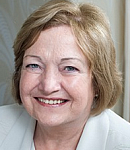 Mairead Maguire was awarded the Nobel Peace Prize in 1976 for her extraordinary actions to end the sectarian violence in her native Northern Ireland. She shares the award with Betty Williams.
Mairead Maguire was awarded the Nobel Peace Prize in 1976 for her extraordinary actions to end the sectarian violence in her native Northern Ireland. She shares the award with Betty Williams.
Mairead was the aunt of the three children who died as a result of being hit by an Irish Republican Army getaway car after its driver was shot by a British soldier. Mairead responded to the violence facing her family and community by organizing, with Betty Williams, massive peace demonstrations appealing for an end to the bloodshed.
Rigoberta Menchú Tum – Guatemala, 1992
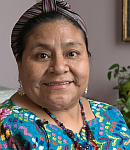 Rigoberta Menchú Tum was awarded the Nobel Peace Prize in 1992 in recognition of her work for social justice and ethno-cultural reconciliation work based on respect for the rights of indigenous peoples in her native Guatemala. She is the first indigenous person to receive the Nobel Peace Prize.
Rigoberta Menchú Tum was awarded the Nobel Peace Prize in 1992 in recognition of her work for social justice and ethno-cultural reconciliation work based on respect for the rights of indigenous peoples in her native Guatemala. She is the first indigenous person to receive the Nobel Peace Prize.
Rigoberta was born in 1959 to a poor Indian family in the highlands of Guatemala. Like many other countries in the Americas, Guatemala has experienced great tension between the descendants of European immigrants and the native Indian population. The Menchú family experienced extreme hardship as a result of their Mayan background.
Jody Williams – USA, 1997
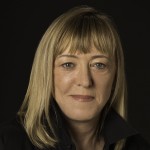 Jody Williams received the Nobel Peace Prize in 1997 for her work to ban landmines through the International Campaign to Ban Landmines, which shared the Peace Prize with her that year. At that time, she became the 10th woman – and third American woman—in its almost 100-year history to receive the Prize. Since her protests of the Vietnam War, she has been a life-long advocate of freedom, self-determination and human and civil rights.
Jody Williams received the Nobel Peace Prize in 1997 for her work to ban landmines through the International Campaign to Ban Landmines, which shared the Peace Prize with her that year. At that time, she became the 10th woman – and third American woman—in its almost 100-year history to receive the Prize. Since her protests of the Vietnam War, she has been a life-long advocate of freedom, self-determination and human and civil rights.
Like others who’ve seen the ravages of war, she’s an outspoken peace activist who struggles to reclaim the real meaning of peace—a concept which goes far beyond the absence of armed conflict and is defined by human security, not national security. Williams believes that working for peace is not for the faint of heart. It requires dogged persistence and a commitment to sustainable peace, built on sustainable development, environmental justice and security, and meeting the basic needs of the majority of people on our planet.
Shirin Ebadi – Iran, 2003
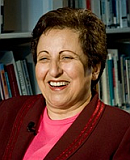 Shirin Ebadi, J.D., was awarded the 2003 Nobel Peace Prize for her efforts to promote human rights, in particular, the rights of women, children, and political prisoners in Iran. She is the first Muslim woman to receive the Nobel Peace Prize, and only the fifth Muslim to receive a Nobel Prize in any field.
Shirin Ebadi, J.D., was awarded the 2003 Nobel Peace Prize for her efforts to promote human rights, in particular, the rights of women, children, and political prisoners in Iran. She is the first Muslim woman to receive the Nobel Peace Prize, and only the fifth Muslim to receive a Nobel Prize in any field.
Dr. Ebadi was one of the first female judges in Iran. She served as president of the city court of Tehran from 1975 to 1979 and was the first Iranian woman to achieve Chief Justice status. She, along with other women judges, was dismissed from that position after the Islamic Revolution in February 1979. She was made a clerk in the court she had once presided over, until she petitioned for early retirement. After obtaining her lawyer’s license in 1992, Dr. Ebadi set up private practice. As a lawyer, Dr. Ebadi has taken on many controversial cases defending political dissidents and as a result has been arrested numerous times.
Leymah Gbowee – Liberia, 2011
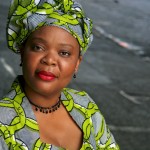 Leymah Gbowee is an inspiring Liberian activist specializing in peacebuilding and women’s rights. After her country erupted in civil war in 1989, Leymah took action by training as a trauma counselor to treat former child soldiers. The war ended in 1996 only to be followed by a second civil war in 1999.
Leymah Gbowee is an inspiring Liberian activist specializing in peacebuilding and women’s rights. After her country erupted in civil war in 1989, Leymah took action by training as a trauma counselor to treat former child soldiers. The war ended in 1996 only to be followed by a second civil war in 1999.
Tired of witnessing violence and brutality, Leymah mobilized women across religious and ethnic divides in the Women of Liberia Mass Action for Peace movement. Her fearless efforts were successful in forcing warlord President Charles Taylor into exile and paving the way for the election of Africa’s first female head of state, fellow Peace Laureate Ellen Johnson Sirleaf. The two share the 2011 Nobel Peace Prize with co-recipient, Tawakkol Karman of Yemen.
Tawakkol Karman – Yemen, 2011
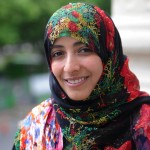 Tawakkol Karman is an inspirational peace activist in her native Yemen and the youngest ever Nobel Peace Prize recipient at the age of 32. In 2005, she founded the organization Women Journalists Without Chains (WJWC) to advocate for rights and freedoms of the press and to report on injustice in Yemen.
Tawakkol Karman is an inspirational peace activist in her native Yemen and the youngest ever Nobel Peace Prize recipient at the age of 32. In 2005, she founded the organization Women Journalists Without Chains (WJWC) to advocate for rights and freedoms of the press and to report on injustice in Yemen.
Shortly after founding WJWC, Tawakkol began organizing large-scale protests to bring an end to violence and human rights violations in her country. Her weekly protests targeted systematic government repression and called for inquiries into corruption. When the Arab Spring swept over North Africa and Western Asia, Tawakkol redirected her supporters and brought the Spring to Yemen. Her persistence and bold, outspoken nature resulted in Yemen’s President Ali-Abdullah Saleh resigning in 2011.
Wangari Maathai – Kenya 2004, Founding Member
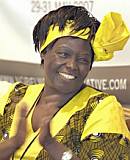 Dr. Wangari Muta Maathai was awarded the Nobel Peace Prize in 2004 for her actions to promote sustainable development, democracy and peace and was the first African woman to receive the Nobel Peace Prize. She passed away in September of 2011.
Dr. Wangari Muta Maathai was awarded the Nobel Peace Prize in 2004 for her actions to promote sustainable development, democracy and peace and was the first African woman to receive the Nobel Peace Prize. She passed away in September of 2011.
The first woman in East and Central Africa to earn a doctorate degree, Professor Maathai was an active member of the National Council of Women of Kenya from 1976 to 1987 and served as its chairman from 1981 to 1987. In 1976 she introduced the idea of community-based tree planting. She continued to develop this idea into a broad-based grassroots organization whose main focus is poverty reduction and environmental conservation through tree planting. The organization eventually became known as the Green Belt Movement (GBM), and to-date has assisted women in planting more than 40 million trees on community lands including farms, schools and church compounds.
Betty Williams – Ireland 1976, Founding Member

that matters most
Get the latest maritime news delivered to your inbox daily.
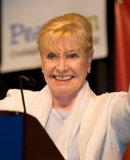 “The Nobel Peace Prize is not awarded for what one has done, but hopefully what one will do.” These are the words of Betty Williams, who in 1976 along with Mairead Maguire, was awarded the Nobel Peace Prize for her work to end the sectarian violence in her native Northern Ireland.
“The Nobel Peace Prize is not awarded for what one has done, but hopefully what one will do.” These are the words of Betty Williams, who in 1976 along with Mairead Maguire, was awarded the Nobel Peace Prize for her work to end the sectarian violence in her native Northern Ireland.
Williams was one of the six founding members of the Nobel Women’s Initiative in 2006 (with Mairead Maguire, Jody Williams, Rigoberta Menchú Tum, Shirin Ebadi, and Wangari Maathai). She currently heads the World Centers of Compassion for Children International, which was founded in 1997 in honour of His Holiness the Dalai Lama. The organization is headquartered in the Republic of Ireland, and is building the first City of Compassion for children in the Basilicata Region of southern Italy. Williams left the Nobel Women’s Initiative in 2011 in order to devote more time to her work there.
